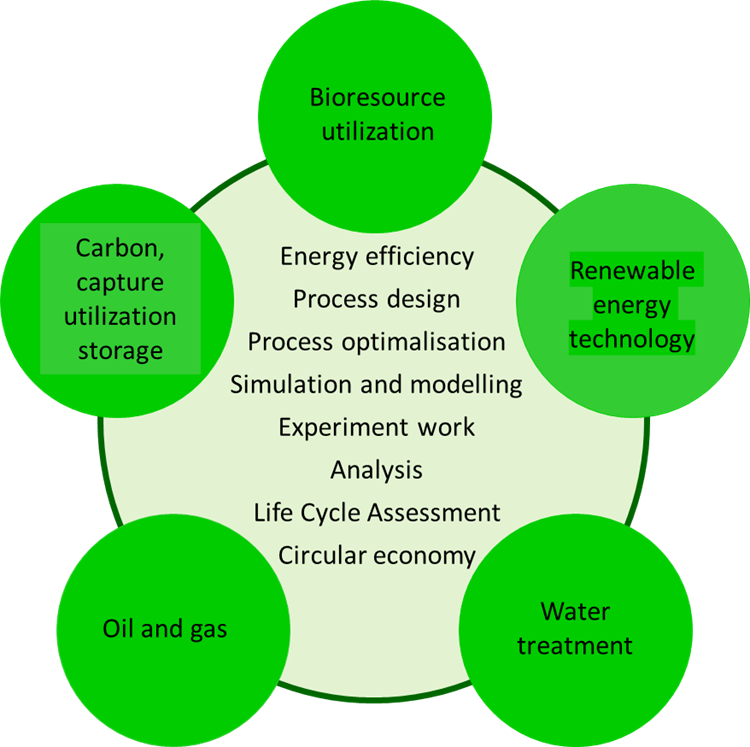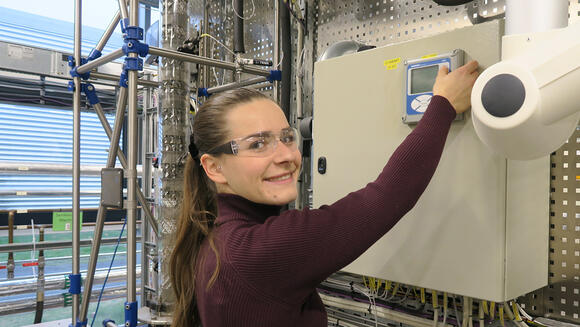This transition requires parallel efforts on:
- Valorization of waste as resource by implementation of more efficient processes applying analysis of energy systems and thermodynamics.
- Transition measures to reduce the environmental impacts of exploration and utilization of fossil resources and adapting for growing renewable fractions.
- Carbon capture, utilization and storage (CCUS).
- Technology for resource recovery, carbon neutral renewable energy, valuable waste resources utilization and enabling processing technology.
- Measures to improve water quality, environmental safeguard and public health.
- Life cycle impact assessment and techno economic analysis of products and processes.
The overall goal of the URGENT research group is to make significant contributions to innovative solutions to the climate challenge, developing concepts for robust energy matrices and reducing the environmental impact of energy technology and side streams. Our research is all assessed in the perspective of a circular economy, for optimum utilizing of our limited resources. URGENT cooperates closely with industry for the development of CO2 -neutral society.
Areas of research

Efficient transition to a low carbon society requires knowledge about renewable energy and CO2 capture, as well as the processes currently used in the energy sector. Such knowledge is integrated in the URGENT research group by combining the efforts of the following areas where we have well established research:
Bioresource utilization
Biomass can be converted to new and useful products or utilized for energy purposes – or both. Nutrients such as nitrogen and phosphorus can be recycled. Sustainable utilization of bioresources is an important contribution to the circular economy and is a key factor in reaching the European climate targets in 2030. Biomass can be organic food waste, residual waste from forestry and agriculture industry, side streams from the processing industry, municipal wastewater or animal manure.
To reduce the climate footprint, it is necessary to replace fossil carbon with "green" carbon from the renewable sources such as photosynthesis. It is therefore important to have knowledge of different types of biomasses, process conditions during handling, as well as good combination possibilities during processing. This will provide the best possible utilization of the biomass and the greatest benefit in terms of emission reductions and value creation.
Dry organic waste types, such as industrial waste fractions or mixed waste fractions remaining after sorting of municipal solid wastes, may have a significant heating value and also a relatively low content of fossil carbon. Thus, replacing coal or other fossil fuels by solid recovered fuels (SRF) or refuse derived fuel (RDF) may reduce the net CO2 emissions from industrial plants traditionally using fossil fuels. Additionally, residual biomass, and contaminated waste could be used in anaerobic digestion and/or gasification for production of biofuels and biochemicals. URGENT has experts in biochemical, chemical, and thermochemical conversion of biomass in experimental design and testing. Moreover, USN has strong competency on modeling, simulation of various processes and its validation.
Carbon capture, utilization and storage
Considering the rising atmospheric CO2 concentration, and that the consequences of global warming are steadily becoming more evident, strong mitigation actions are needed.
Among the options for CO2 removal from combustion exhaust gases, amine-based chemical absorption is the most developed method. It is also the method that is dominating the current research field. The research group has a broad competence in post-combustion CO2 capture by using amine-based solvents. We are experts in process optimization, process simulation and cost estimation of carbon capture plants. At USN we have also developed a laboratory plant for CO2 capture. Amine degradation from these types of plants can contribute to challenging environmental impacts that need to be addressed, and solvent management is one of our research topics.
We have a close cooperation with industry and have contributed to the development of the CO2 capture plant at Heidelberg Materials, Brevik.
It is worth noting that the captured CO2 from emission sources has a negative value since the producer will have to pay for transport and storage. Therefore, CO2 could become a low-cost raw material and be utilized in production of valuable products. Among the methods being explored to utilize captured CO2 is ester formation.
Electrification of the industry is of key importance in the transition from a fossil to a green industry. For high-temperature processes, like cement production, this is challenging. However, replacing fuel combustion with electrical power gives some new possibilities in the form of integrated CO2 capture. URGENT has for several years worked on electrification of cement calciners combined with CO2 capture. This may reduce CO2 emissions from cement plants by more than 70 %, and by hybrid solutions close to 100 % capture will likely be possible.
Oil and gas
Oil and gas will remain the most important sources of energy for the foreseeable future according to DNV’s Energy Transition Outlook 2021, and there is an urgent need to improve oil and gas recovery to obtain a lower carbon footprint and meet the future energy demands. Reservoir technology studies, relevant for low impact production and carbon storage, and environmentally sound handling of waste (e.g., drill cuttings), are studied in cooperation with the petroleum industry. Oil and gas utilization is, in the URGENT perspective, part of the problem but also a necessary part of the solution to achieve an efficient transition to carbon neutrality. Storing captured CO2 in oil reservoirs is an example of a concept that will reduce the climate impact of oil production.
Water treatment
The water treatment and environmental biotechnology research at USN has the main focus on water quality parameters and biological water treatment processes. The group aims for a deep understanding of biological, chemical and physical phenomena in bioreactors. The research activities cover cost efficient water treatment and infrastructure solutions to reduce water related environmental problems and associated risks to human life. This includes research work to develop efficient water treatment solutions for new circular economy value chains to monitor, assess and manage the integrated water system and protect its critical assets, from source to tap to wastewater treatment. Furthermore, new and innovative technologies for resource recovery in the form of water, energy, nutrients from wastewater are important aspects that have most relevance in the global environmental perspectives. In a nutshell, our research projects work contributes to identifying and establishing resilient and sustainable water management and infrastructure solutions to achieve sustainable development goals (SDGs).
Renewable energy technology
URGENT acknowledges the need for a global climate transition and strives to help drive decarbonization in the real economy. Renewable energies are an important part of the solution to this transition. All renewable energy sources can, directly or indirectly, be converted to electricity. While some sources, such as wind and solar power, are only intermittently available, other sources can continuously generate energy , but they might not be available at the location where the energy is needed. Therefore, an efficient transition to a decarbonized society requires knowledge about a reasonable mix of all renewable energy sources in the energy sector. Some renewable energy sources, like hydropower, are well established. However, ocean-related energy and solar energy sources have a massive potential to speed up the transition.
The aim of the research group is to make a significant impact on accelerating the global climate transition through generating innovative and new technologies that will economically utilize renewable energy sources. URGENT studies power from wind, waves and water currents; tidal energy devices and floating solar PV energy devices.
Partners and networks
Some of our collaborators:
- Alstrom
- Biowater Technology AS
- Biowater
- Eramet
- Equinor
- Heidelberg Materials
- Inflow Control
- Lindum
- Norske Skog
- NIBIO
- NMBU
- Norner
- Norsk Senter for sirkulær økonomi (NCCE)
- Norsus
- NTNU
- SINTEF Energi
- SINTEF Industri
- Scanship AS
- ScanWater AS
- Universitetet i Ager
- Universitet i Stavanger
- Universitetet i Tromsø
- Vesar
- Yara
- ZEG
- Porsgrunn Kommune
- Telemark Fylkeskommune
- Vestfold Fylkeskommune
Ongoing Research Projects
- ELECTRA
- FME – Bio4Fuels
- ENRICH
- AlkoPop
- WASH4ONEHEALTH
- Improved Multiphase Flow Performance Using Autonomous Inflow Control Valve and its Potential Impact on Reservoir Recovery
- Instituting of research-based education systems for the development of renewable energy technology in circular economy; A joint project among the Universities in Norway, Nepal, Bangladesh and Sri Lanka (ReTech)


























